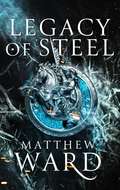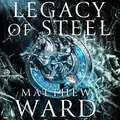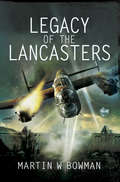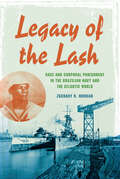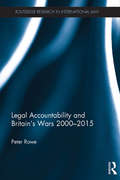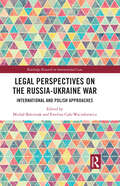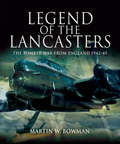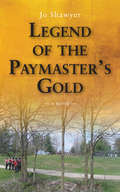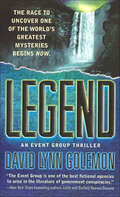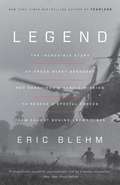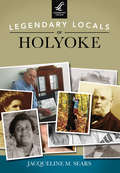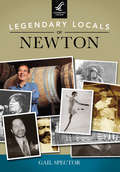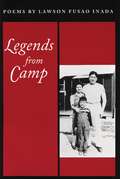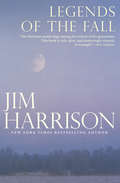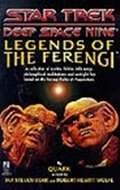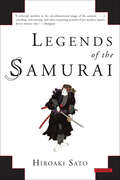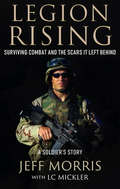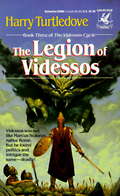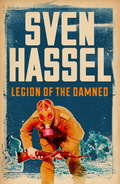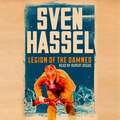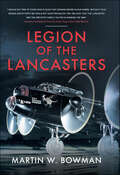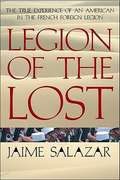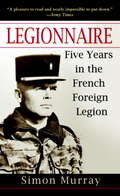- Table View
- List View
Legacy of Steel: Book Two of the Legacy Trilogy (The Legacy Trilogy)
by Matthew Ward'Outstanding' Publishers Weekly (starred review)Warfare, myth and magic collide in Legacy of Steel, the spectacular sequel to Matthew Ward's acclaimed fantasy debut, Legacy of Ash. A year has passed since an unlikely alliance saved the Tressian Republic from fire and darkness - at great cost. Thousands perished, and Viktor Akadra - the Republic's champion - has disappeared. While the ruling council struggles to mend old wounds, other factions sense opportunity. The insidious Parliament of Crows schemes in the shadows, while to the east the Hadari Emperor gathers his armies. As turmoil spreads across the Republic, its ripples are felt in the realms of the divine. War is coming . . . and this time the gods themselves will take sides.Praise for the series:'A hugely entertaining debut' John Gwynne'Epic fantasy as it should be; big, bold and very addictive' Starburst'Incredible action scenes' Fantasy Hive'Magnificent and epic' Grimdark Magazine
Legacy of Steel: Book Two of the Legacy Trilogy (The Legacy Trilogy)
by Matthew Ward'Outstanding' Publishers Weekly (starred review)Warfare, myth and magic collide in Legacy of Steel, the spectacular sequel to Matthew Ward's acclaimed fantasy debut, Legacy of Ash. A year has passed since an unlikely alliance saved the Tressian Republic from fire and darkness - at great cost. Thousands perished, and Viktor Akadra - the Republic's champion - has disappeared. While the ruling council struggles to mend old wounds, other factions sense opportunity. The insidious Parliament of Crows schemes in the shadows, while to the east the Hadari Emperor gathers his armies. As turmoil spreads across the Republic, its ripples are felt in the realms of the divine. War is coming . . . and this time the gods themselves will take sides.Praise for the series:'A hugely entertaining debut' John Gwynne'Epic fantasy as it should be; big, bold and very addictive' Starburst'Incredible action scenes' Fantasy Hive'Magnificent and epic' Grimdark Magazine
Legacy of the Lancasters
by Martin W. BowmanYoung or old, everyone has heard of the Lancaster bomber. Such is the legacy handed down by this aviation icon that although it is not the most numerous aircraft ever built - two are still flying today, one in Britain and another in Canada with many proudly displayed in museums throughout the world - it is up there with the Spitfire and the Flying Fortress in terms of affection, nostalgia and lasting fame.The legendary Lancaster has bequeathed to the world an invaluable heritage beloved of generations of movie-goers, air show enthusiasts, readers of fine literature and historians alike. Exploits such as the famous low-level raid by 617 Squadron on Germanys hydro electric dams on the night of 16/17 May 1943, the nightly raids on Germany and the sinking of the Tirpitz in 1945 are all without equal.At the 50th anniversary of the raid in 1993 more than 70,000 people thronged Derwent Water to watch the BBMF Lancaster roar over the same dam that 617 practiced on shortly before the raid on 16/17 May 1943. As we approach the 70th Anniversary of the raid, such scenes will no doubt play out once again. It seems timely therefore that such a history should be recorded, charting the course of the Lancasters career in the skies and the legacy it continues to provide for new generations of aviation enthusiasts and pilots.The text is supplemented throughout by an exciting selection of black and white images that work to evoke a real sense of the scale and majesty of this iconic aircraft. An additional colour plate section boasts a captivating range of shots, showing the aircraft in full glory.
Legacy of the Lash: Race and Corporal Punishment in the Brazilian Navy and the Atlantic World (Blacks in the Diaspora)
by Zachary R. MorganA history of corporal punishment in the Brazilian navy and the four-day mutiny that took Rio hostage and put an end to the violent practice.Legacy of the Lash is a compelling social and cultural history of the Brazilian navy in the decades preceding and immediately following the 1888 abolition of slavery in Brazil. Focusing on non-elite, mostly black enlisted men and the oppressive labor regimes under which they struggled, the book is an examination of the four-day Revolta da Chibata (Revolt of the Lash) of November 1910, during which nearly half of Rio de Janeiro’s enlisted men rebelled against the use of corporal punishment in the navy. These men seized four new, powerful warships, turned their guns on Rio de Janeiro, Brazil’s capital city, and held its population hostage until the government abolished the use of the lash as a means of military discipline. Although the revolt succeeded, the men involved paid dearly for their actions. This event provides a clear lens through which to examine racial identity, violence, masculinity, citizenship, modernity, and the construction of the Brazilian nation.“Offering new insights into the spectacular sailors’ revolt of 1910, Zachary R. Morgan treats the “deep structure” of Brazilian naval discipline, one based primarily on flogging. Slavery was only abolished in 1888, and the mutineers, largely of African descent, saw flogging as an intolerable holdover from the slave era. Morgan also shows the incompatibility of the old labor regime and modern naval technology. Trained on the new battleships in the English shipyards where they were built, Brazilian sailors increasingly viewed themselves as citizens in uniform.” —Joseph L. Love, University of Illinois, Urbana-Champaign“Legacy of the Lash is a stellar contribution to the growing global scholarship on mutiny and maritime radicalism. Zachary R. Morgan brings back to vibrant life the history-making powers of Brazil’s motley crews in the early twentieth century.” —Marcus Rediker, author of The Slave Ship: A Human History
Legal Accountability and Britain's Wars 2000-2015 (Routledge Research in International Law)
by Peter RoweThis book discusses the manner in which Britain’s wars, which took place between 2000 and 2015, have interacted with the relevant principles of international law and English law for the purpose, primarily, of considering legal accountability. During a debate in the House of Lords in 2005 a former Chief of the Defence Staff commented that ‘the Armed Forces are under legal siege.’ The book will discuss the major legal issues which have arisen, ranging from the various votes in Parliament to go to war, the constitutional relationship between ministers and senior commanders, the right under international law to use force, the influence of human rights law, the role of the courts in England (including the coroners’ courts), to the legal regime applying to the conduct of UK military operations. It will assess critically whether the armed forces will now have to accept that operations conducted outside the UK are subject to greater legal scrutiny than previously and whether, if this is the case, it is likely to hinder their future military activities. This book will be of great interest to scholars of international law, the law of armed conflict, military studies and international relations, as well as to those with a professional or other interest in the subject matter.
Legal Normativity in the Resolution of Internal Armed Conflict
by Philipp KastnerWith an estimated ninety-five percent of the world's armed conflicts occurring within individual states, resolution and prevention of internal conflicts represent a main driver of global peace. Peace negotiations stand outside the traditional formalism of lawmaking and represent a uniquely privileged moment to observe the rise or adjustment of the legal framework of a given state. Based in a socio-legal and pluralistic understanding of law, this book explores the normative dynamics of peace negotiations. It argues that the role of law in the peaceful resolution of internal armed conflicts has been greatly underestimated and that legal theory can and should contribute to a better comprehension of these processes. Including thematic case studies from Darfur, North-South Sudan, Uganda, Côte d'Ivoire, Colombia, Sri Lanka, Sierra Leone, Mozambique, Bosnia and Israel-Palestine, this volume will be of use to scholars, students and affiliates of international organizations and non-governmental organizations.
Legal Perspectives on the Russia-Ukraine War: International and Polish Approaches (Routledge Research in International Law)
by Michał Balcerzak and Ewelina Cała-WacinkiewiczThis book critically examines the legal ramifications of Russia’s invasion of Ukraine and the aftermath of these events. Combining international and domestic perspectives, it synthesises nearly three years of legal responses to the aggression.Russia's aggression against Ukraine has triggered profound legal challenges with far-reaching implications for the states directly involved, third parties, and the international legal order. This book offers a comprehensive analysis of the international and domestic legal dimensions of the conflict. Beginning by exploring the international legal framework, including assessing the responses of the United Nations' system and key legal issues arising from the war. Exploring topics such as human rights, international humanitarian law, and the law of war, the book also analyses Poland’s response to the war, discussing the legislative and policy measures undertaken to address the impact of the crisis. Poland, Ukraine’s immediate neighbour, has played a pivotal role in managing the unprecedented influx of Ukrainian refugees and adapting its legal framework to the challenges posed by the war. The book uses Poland as a lens through which to examine the international legal response.This book will be of interest to researchers in the field of international law and human rights law.
Legend of the Lancasters: The Bomber War from England, 1942–45
by Martin W. BowmanThis book is a riveting account told in ten big chapters of the young RAF crews who flew Lancasters in RAF Bomber Command from 1942 to the end of the war in Europe in April 1945. It is unique in that the story is told using first person accounts from RAF aircrew and German night fighter crews who fought each other on raids on occupied Europe and Germany from 1942 onwards. Details of what it was like to be on the receiving end in Hamburg, Berlin, Cologne etc are also included. A whole host of incredible first-hand accounts by British, Commonwealth, American and German air crews permeate the action and describe the aerial battles as only they can. This unique book also includes many accounts and photos that have not previously been seen before while the rich mix of combat accounts from all sides are brought together for the first time in one volume.
Legend of the Paymaster's Gold
by Jo ShawyerLegend has it that a paymaster lost his gold during the War of 1812, and Sam, Eadie, and Ben are determined to find it. The Jackson family has moved into an old house on Commissioners Road near London, Ontario, and twins Sam and Eadie discover an exciting legend that involves their new home. Their neighbour, Ben, tells them that a skirmish in the War of 1812 took place right in front of their house, and that, during the fight, it is thought that an army paymaster lost a chest of gold that has never been recovered. Sam, Eadie, and Ben decide to solve the legend and find the lost gold. But almost two hundred years have passed. How will they know where to look? What clues are there to follow? With the help of the Internet, Dave at the library, and some clever sleuthing with maps and a metal detector, they make some progress. But why are all the most likely places to find the gold off-limits?
Legend: An Event Group Thriller (Event Group Thrillers #2)
by David Lynn GolemonA secret agency must face an ancient beast deep within the Amazon—and powerful forces out to profit from its legend—in this supernatural thriller.Brazil, 1533: A Spanish expedition finds the legendary El Dorado, the largest gold deposit in the world. But in the lost valley hidden from the march of time, the explorers also awakened a devil. A beast of the Amazon rises to destroy any who threaten the secret of the Incas. But one soldier survives long enough to share his story: a secret the Vatican quickly buried away.Present Day: Professor Helen Zachary and her team are searching for a legend buried deep within the Amazon Basin when they suddenly vanish. Now the top secret Event Group, led by Major Jack Collins, must find them. Using cutting-edge military technology, they travel from Brazil to the Little Bighorn, from Columbia to the hallowed grounds of Arlington National Cemetery. As they do, the Event Group faces mounting opposition from multiple adversaries bent on either discovering the whereabouts of El Dorado . . . or trying to bury the legend forever.
Legend: The Incredible Story of Green Beret Sergeant Roy Benavidez's Heroic Mission to Rescue a Special Forces Team Caught Behind Enemy Lines
by Eric BlehmThe true story of the U.S. Army&’s 240th Assault Helicopter Company and a Green Beret Staff Sergeant's heroic mission to rescue a Special Forces team trapped behind enemy lines during the Vietnam War, from New York Times bestselling author Eric Blehm. On May 2, 1968, a twelve-man Special Forces team covertly infiltrated a small clearing in the jungles of neutral Cambodia—where U.S. forces were forbidden to operate. Their objective, just miles over the Vietnam border, was to collect evidence that proved the North Vietnamese Army was using the Cambodian sanctuary as a major conduit for supplying troops and materiel to the south via the Ho Chi Minh Trail. What the team didn&’t know was that they had infiltrated a section of jungle that concealed a major enemy base. Soon they found themselves surrounded by hundreds of NVA, under attack, low on ammunition, stacking the bodies of the dead as cover in a desperate attempt to survive the onslaught. When Special Forces Staff Sergeant Roy Benavidez heard their distress call, he jumped aboard the next helicopter bound for the combat zone. What followed would become legend in the Special Operations community. Flown into the foray of battle by the 240th Assault Helicopter Company, Benavidez jumped from the hovering aircraft, ran nearly 100 yards through withering enemy fire, and--despite being immediately and severely wounded--organized an extraordinary defense and rescue of the Special Forces team. Written with extensive access to family members, surviving members of the 240th Assault Helicopter Company, on-the-ground eye-witness accounts never before published, as well as recently discovered archival, and declassified military records, Blehm has created a riveting narrative both of Roy Benavidez&’s life and career, and of the inspiring, almost unbelievable events that defined the brotherhood of the air and ground warriors in an unpopular war halfway around the world. Legend recounts the courage and commitment of those who fought in Vietnam in service of their country, and the story of one of the many unsung heroes of the war.
Legendary Locals of Holyoke
by Jacqueline M. SearsHolyoke is home to some of the most amazing and courageous individuals. In 1658, European pioneer John Riley, along with other early planters, was instrumental in establishing a community in the West Springfield area called Ireland Parish, which eventually became known as Holyoke. This tenacious man led the way for many other trailblazers, including George Ewing, who envisioned utilizing hydropower to operate factories and inspired town engineers to design one of the first planned cities in the United States. In 1898, the progressive Elizabeth Towne encouraged Holyoke residents and an international audience with her New Thought movement that advocated a healthy lifestyle. Another outstanding citizen, Timothy Alben, judiciously leads the Massachusetts State Police, while Holyoke's Henry Jennings honorably served his country in the armed forces, as a commander of the Holyoke War Memorial Building, and on the Holyoke City Council. Barbara Bernard has astutely kept residents informed about current events for the last 70 years. Legendary Locals of Holyoke chronicles the community's finest men and women who survived and prospered through harsh circumstances and against all odds.
Legendary Locals of Newton
by Gail SpectorNewton has more than enough legendary locals to fill volumes of books. Endless are the stories about men, women, and young people who dedicated, or still dedicate, countless hours of their lives in order to make Newton and the world a better place. Newton has been a launching ground for award-winning authors, Nobel Prize winners, Olympic medalists, and Hollywood stars. Some of Boston's best athletes have chosen to make "the Garden City" their home. In the pages of this book, readers will learn about Newton's first mayor, James Hyde, who never lost an election in more than 50 times on the ballot; Rev. Edmond Kelley, the first pastor at Myrtle Baptist Church and a former slave; Leonard Zakim, regional director of the Anti-Defamation League who dedicated his life to fighting prejudice and civil rights violations; Louise Bruyn, who walked from Newton to Washington, DC, to protest the Vietnam War; Shirley Lewis, known as the "regal queen of the blues"; and Ted Williams, regarded as baseball's greatest hitter, who lived in Newton Upper Falls.
Legends from Camp
by Lawson Fusao InadaInada talks about life in Japanese internment camps, jazz, and living in Fresno, CA. Inada's poems are playful, engaging and directed towards a wide audience.
Legends of the Fall (Colección Vib Ser. #Vol. 50)
by Jim HarrisonThree novellas by the New York Times bestselling author, including the classic tale of brotherhood from the Montana plains through the horrors of WWI. Jim Harrison&’s critically acclaimed novella &“Legends of the Fall&”—which was made into the film of the same name—is an epic tale of three brothers fighting for justice in a world gone mad. Moving from the expansive landscape of early twentieth-century Montana to the blood-drenched battlefields of World War I Europe, Harrison explores the desperate actions of which men are capable when their lives or aspirations are threatened. Also including the novellas &“Revenge&” and &“The Man Who Gave Up His Name,&” Legends of the Fall confirms Jim Harrison&’s reputation as a writer who &“stands high among the writers of his generation. This book is rich, alive, and shatteringly visceral. A triumph&” (New Yorker). &“I can&’t begin to do justice to the nuances of character and honest complexities of plot in this work. The writing is precise and careful—and sings withal.&” —Raymond Carver, Washington Post Book World
Legends of the Ferengi (Star Trek: Deep Space Nine)
by Ira Steven Behr Robert Hewitt WolfeA collection of the guiding principles of the galaxy's most successful entrepreneurs, using coveted Ferengi wisdom and recounting legendary tales of profit.For centuries the famous Ferengi "Rules of Acquisition" have been the guiding principles of the galaxy's most successful entrepreneurs. But the wisdom behind them was not won without a high cost in lives and latnium. Now at last these inspiring tales of avaricious Ferengi wresting monetary gain from the jaws of poverty are available to the profit-hungry across the galaxy!
Legends of the Samurai
by Hiroaki SatoThis authoritative history of Japan’s elite warrior class separates fact from myth as it chronicles centuries of samurai combat, culture, and legend.In Legends of the Samurai, Hiroaki Sato examines the history of these medieval Japanese warriors, as well as the many long-standing myths that surround them. In doing so, he presents an authentic and revealing picture of these men and their world. Sato’s masterful translations of original samurai tales, laws, dicta, reports, and arguments are accompanied by insightful commentary. With incisive historical research, this volume chronicles the changing ethos of the Japanese warrior from the samurai's historical origins to his rise to political power. A fascinating look at Japanese history as seen through the evolution of the samurai, Legends of the Samurai stands as the ultimate authority on its subject.
Legion Rising: Surviving Combat and the Scars It Left Behind
by Jeff Morris LC MicklerA U.S. Army Platoon Leader shares an honest account of Iraq War combat and his long journey of healing from trauma in this military memoir. During his time in Iraq, Jeff Morris saw and experienced some truly harrowing events, such as the time he had to pulled shards of another man's skull from the palm of his hand. When he got home, he struggled for years just to face his own reflection. In Legion Rising, Morris provides a candid account of his service—from the rigors of military training through the thrills, dangers, and tragedies of combat. Morris tells of losing eight men in the line of duty, and of the second battle he faced once his combat service was over. Scarred by trauma and haunted by the past, Morris faced a long struggle before his ultimate rise from adversity.
Legion of Videssos
by Harry TurtledoveSince the Roman legion had been mysteriously transported to this world of magic, tribune Marcus Scaurus had served the rulers of war-torn Videssos well. He had been largely responsible for ousting the Pretender and putting Thorish Gavras on the throne. That, of course, made him a hero.Rome or Videssos, however, Fortune was a fickle goddess.Now he and the legion were returning in triumph to Videssos the city after defeating a well-entrenched army of rebel mercenaries. But Marcus, betrayed by the one closest to him, was returning to be seized, dragged before the Emperor, and questioned under truth-drug like a traitor.Of the court, only Alypia Gavra stuck by him -- but consorting with the Emperor's niece was dangerous. It could lead to exile -- or death!Yet Alypia was attractive. And Marcus was lonely . . .From the Paperback edition.
Legion of the Brave
by D. P. RamachandranSights and sounds of a glorious fortnight - tank pennants fluttering in the wild amidst the dust and fury of the battle, the gleam of the bayonets and the echo of the battle-cry as a barrage was laid ...... Bangladesh, 1971, a legend is born.
Legion of the Damned
by Sven HasselSven Hassel's iconic war novel about the Russian Front.'An extraordinary book, which has captured the attention of all of Europe' - NEW YORK TIMES'LEGION OF THE DAMNED is an incredible picture of totalitarianism, of stupefying injustice ... He is graphic, at times brilliantly so, but never brutal or bitter. He is, too, a first-rate storyteller' - WASHINGTON POSTConvicted of deserting the German army, Sven Hassel is sent to a penal regiment on the Russian Front. He and his comrades are regarded as expendable, cannon fodder in the battle against the implacable Red Army. Outnumbered and outgunned, they fight their way across the frozen steppe...This iconic anti-war novel is a testament to the atrocities suffered by the lone soldier in the fight for survival.Sven Hassel's unflinching narrative is based on his own experiences in the German Army. He began writing his first novel, LEGION OF THE DAMNED in a prisoner of war camp at the end of the Second World War.
Legion of the Damned (Sven Hassel War Classics)
by Sven HasselAn extraordinary book, which has captured the attention of all of Europe' - NEW YORK TIMES'LEGION OF THE DAMNED is an incredible picture of totalitarianism, of stupefying injustice ... He is graphic, at times brilliantly so, but never brutal or bitter. He is, too, a first-rate storyteller' - WASHINGTON POSTConvicted of deserting the German army, Sven Hassel is sent to a penal regiment on the Russian Front. He and his comrades are regarded as expendable, cannon fodder in the battle against the implacable Red Army. Outnumbered and outgunned, they fight their way across the frozen steppe...This iconic anti-war novel is a testament to the atrocities suffered by the lone soldier in the fight for survival.Sven Hassel's unflinching narrative is based on his own experiences in the German Army. He began writing his first novel, LEGION OF THE DAMNED in a prisoner of war camp at the end of the Second World War.Read by Rupert Degas(p) 2014 Orion Publishing Group
Legion of the Lancasters
by Martin W. BowmanSöthe had already decided to use his nose armament against the 4-mot [four engined bomber]. He looked out and focused on a black shape of the Britisher. Small, bluish exhaust flames made it easier to keep the target in sight. Four engines, twin tail were recorded almost subconsciously. No sudden movement that might attract their attention. Calm now! Guns armed? Night sight switched on? Everything OK! Now he could see that it was a Lancaster, crossing gently from starboard to port. He applied a little more power and approached cautiously. Now he was exactly behind him at about 100 metres’ range. The rear turret was clearly recognisable. Brönies kept silent. ‘Pauke! Pauke!’ [‘Kettledrums! Kettledrums!’] Söthe announced with a cry. Brönies immediately transmitted ‘Ich beruhe’. Then they closed in rapidly for the kill. One can almost smell the flak, taste the cordite and experience the nervous ‘twitch’ before jumping out of one’s skin to the sound of exploding shells and detonating bombs in this pulsating and highly intriguing selection of never-before-told stories recalled largely by members of the revered Lancaster crews of RAF Bomber Command. From this bomber’s introduction into service in 1942 with the famous if flawed raid on Augsburg on 17 April that year, to the attacks on the Tirpitz in 1944, each chapter is a tribute to the spirit of those who flew the ‘Lanc’ in anger and gained the respect of their enemies.
Legion of the Lost
by Jaime SalazarThe son of underpaid Mexican immigrants, Jaime earned a degree in mechanical engineering from Purdue. But at twenty-three, he was disillusioned with the corporate fast track. So he became an outcast American in a hard-bitten group of recruits-men on the run from their pasts, men without hope: He joined the French Foreign Legion. From the Legion's notoriously brutal training to Salazar's fierce competitiveness, ultimate disillusionment and dramatic desertion, Legion of the Lost is a compelling, firsthand account of today's French Foreign Legion that will dispel myths while adding to the legend of the finest trained army of warriors the world has ever known.
Legionnaire: Five Years in the French Foreign Legion
by Simon MurraySimon Murray was nineteen when he joined the French Foreign Legion. Inspired by the romantic myths of Beau Geste, he found himself in the ranks of one of the world's greatest - and toughest - fighting forces. He kept a unique diary of the hard living, harsh discipline, and the military tradition of 'March or Die' which he turned into this gripping book. 'Simon Murray's personal account of a gently reared, well-educated British youth's coming of age in the French Foreign Legion has the drama, excitement and colour of a good guts-and-glory thriller ... Murray is a talented storyteller, and his fellow legionnaires and their disciplined and proud Corps are vividly portrayed. I was hooked from the first page.' Dr. Henry Kissinger. 'One of the greatest adventure stories in recent years.' Chris Patten.
